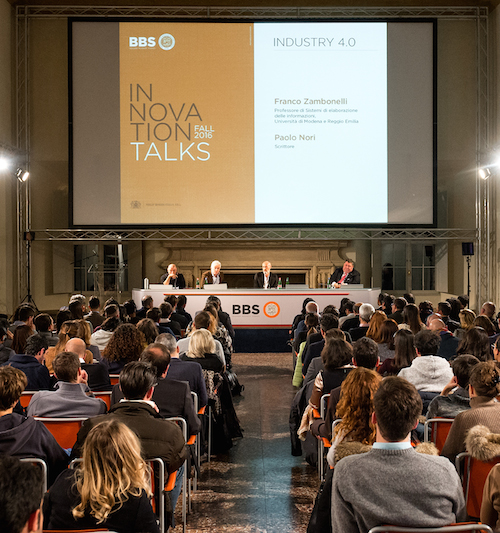
“Things govern us: cloaks, buttons and other stories.”
19 December 2016Franco Zambonelli, Professor of Computer Engineering and Paolo Nori, writer, were the protagonists of the last appointment with the Innovation Talks on the theme Industry 4.0.
Here the Photogallery of the Innovation Talks.
The meaning of things, the shape of things, the function of things. The government of things and the risk of being ruled by things. The theme of the Industry 4.0 in its closing event questions the relationship between human beings and objects, and the physical and / or emotional control they are exercising over us.
The arguments in previous meetings have tried to reconcile the innate human fears with the inevitability of a technological change, where the man, creator and spectator at the same time, can only rely on its ability to adapt to live in balance with this new context. The speakers of this latest Innovation Talk are basically of the same opinion. They have simply overturned the point of view on the relationship between man and machine.
On the one hand the writer Paolo Nori, spoke about the object Button. In the wake of our own memories, the button can represent the person, his history, when the identity of the person, his body has disappeared. It demonstrates how objects, apart from their function, can arouse emotions and represent, because tey are artifacts, the human aspect of inorganic elements. Behind a conserved button it has existed a shirt, and this was worn by a person not here anymore. The objects in short, are not only objects, but evidence of the human being. Of his genius and of his existence.
Along the same line is the intervention of Franco Zambonelli, who in his speech talked about things, objects that collectively manage to display an intelligent behavior. As the ants are able to interact between them to replace the missing part of a path, create a bridge between two parts joining their bodies, so the robotic units of today are able to create connection networks able to build other even more complex objects.
And this is the case of so-called 4D printers, which add to the three dimensions the fourth, time. Many small units can take the form of an airplane following pulses identical to those of the pheromones emitted by the bodies of ants and other living beings. The chemical messages that stimulate the construction, or reconstruction, of missing parts through an exchange of information. The only difference with nature is that where governed by the basic needs, such as satisfying hunger, in robotics to govern is the functional purpose. Like moving from one point to another by assuming the posture of a quadruped or that of a reptile crawling to overcome slippery surfaces.
The robots are able to learn on their own, to achieve the target set by the organization. And the thought of Professor Zambonelli goes to the issue of the Talks, the Industry 4.0, asking a series of questions. If the robots will be able to organize the entire supply chain, from the orders, warehouse, manufacturing, to shipping, it means that we will need to form a ruling class, a human one, able to learn to control this new workforce. There is talk of Algocrazia, the Government of the algorithms. Knowing its meaning, learn to speak the language, will become a necessary skill to interact efficiently with the autonomous machines.
A future where artificial intelligence, opposed by human stupidity, learns from single-celled organisms to act collectively in a functional way to a purpose and in response to the difficulties in context. And on collective intelligence will not be bet only the future of technology, but also the role of those who will govern this complex world, managers and students of BBS first. “We are a republic founded on work. We must not become a republic founded on things.” concluded Zambonelli ” But we can aspire to be a republic founded on people.”
Marco Roccetti, Professor of the Department of Computer Science and Engineering, and Max Bergami, Dean of BBS, attended the event as discussants.
The event was organized in collaboration with Philip Morris Italia.
